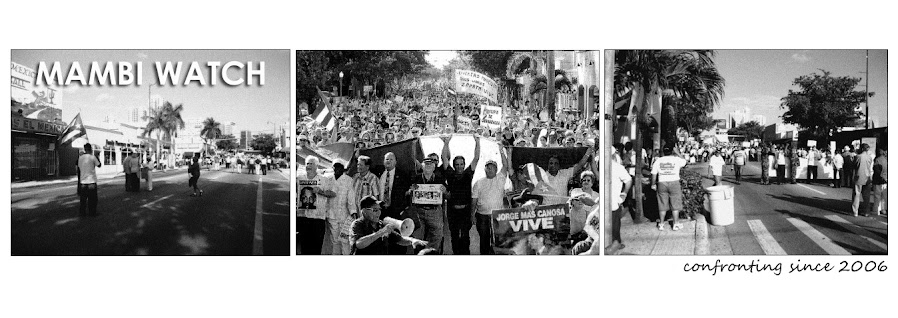 Plenty of additional commentary and information about Bush's new speech on Cuba policy arrived this weekend.
Plenty of additional commentary and information about Bush's new speech on Cuba policy arrived this weekend.On Friday, Miami Herald's Alfonso Chardy reported on the preparation for Bush's speech and how Cuban exile hard-liners in Miami helped. According to Chardy, there was a "select group of 10 who met with Bush in Miami on Oct. 12." George W. Bush was in Miami on October 12, scheduled to give a speech at the downtown Radisson about "expanding trade and investment" with Latin America. While the majority of the speech dealt with recent trade deals concerning Peru, Colombia and Panama, Bush also had time to elaborate about strengthening "the forces of freedom and democracy throughout the Americas", which included a few words on Cuba: "And the vision I have for our hemisphere includes a free and democratic Cuba." This comment was followed with an audience member yelling out: "Viva Bush!"
Alfonso Chardy provided additional information to what Ninoska Pérez Castellón was already telling Radio Mambi listeners two days before. After Bush's speech on Wednesday, Pérez Castellón was mentioning on her 3pm show how she helped arrange some of the meetings on Oct. 12th with Bush and the families of the political prisoners mentioned. Including Pérez Castellón and Radio Mambi's programming director Armando Perez Roura, Chardy includes "Remedios Díaz Oliver of the U.S. Cuba Democracy PAC and the Liberty Council; former state Rep. Gastón Cantens, and Florida's Republican Cuban-American lawmakers, Sen. Mel Martínez and Reps. Ileana Ros-Lehtinen and Lincoln and Mario Díaz-Balart" as part of the "select group of 10."
It's pretty clear to see whose voices were represented in Bush's speech. Chardy also presents some interesting quotes, such as Armando Pérez Roura saying: "I said to [Bush] that for me he was the last hope of Cubans in exile and that we were concerned by the rapprochement [the Cuban regime] was pursuing, without instituting any change." I found this quote as either an honest sign of desperation by one of Miami's most hard-line voices, or another desperate attempt to coax Bush into supporting a hard-line position.
Also, according to Chardy, "[o]fficials familiar with the discussions, who declined to be identified because they did not want to talk publicly about internal deliberations, said the speech was in the works for months." This makes some sense. I found out that the cheesy line in Bush's Wednesday speech that goes "the light of liberty will shine on Cuba" goes back to April 28 when Bush said the same thing delivering a commencement address at the Miami Dade College. And, the inclusion of families of Cuban political prisoners, such as Yamile Llanes Labrada (wife of Jose Luis Garcia Paneque), was probably already being planned since early October given Labrada's appearance on Oct. 10th at the Rose Garden for the Hispanic Heritage Month celebration at the White House.
But, other things in the speech like the mention of Armando Valladares, a 22-year Cuban political prisoner, and the "tropical gulag" descriptor go back years! Valladares released a popular book in 1986 originally titled "Against All Hope: The Prison Memoirs of Armando Valladares", which recounts his torture in Cuba's prisons. The book helped coin the phrase "Castro's gulag" since "gulag" seemed the most apt for the time. Then-Pres. Reagan made sure to include Valladares in his speech on Dec. 1986 to designate Human Rights Day. The following year, Pres. Reagan nominated Valladares as a US representative to the UN. The Cuban government became fiercely opposed to the appointment. Today, Valladares' book is subtitled "A Memoir of Life in Castro's Gulag." Since then, Valladares has been repeatedly mentioned in other Reagan speeches, including remarks celebrating Cuban Independence Day (May 20th, 1902), a gesture also copied by former Pres. George H.W. Bush. ("Tropical Gulag" may have been coined by Global Options in 1987 with the publication of "Tropical Gulag: The Construction of Cold War Images of Cuba in the United States.")
But, in general, Bush's speech is unchanged since 2001 when celebrating Cuban Independence Day in the White House said: "History tells us that forcing change upon repressive regimes requires patience." Patience indeed! And, so we wait, just like Presidents before.
Carl Hiassen yesterday in the Herald characterized it well: "Bush's speech was recycled from his father, who recycled it from Ronald Reagan, who recycled it from Richard Nixon, who recycled it from Lyndon Johnson, who recycled it from John F. Kennedy." He's right.
(Babalu Blog's Henry Gomez has a rebuttal to Hiassen's column.)
[Part 1]

No comments:
Post a Comment